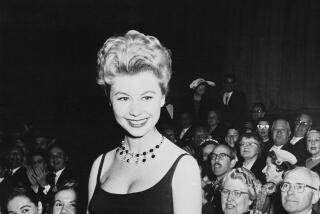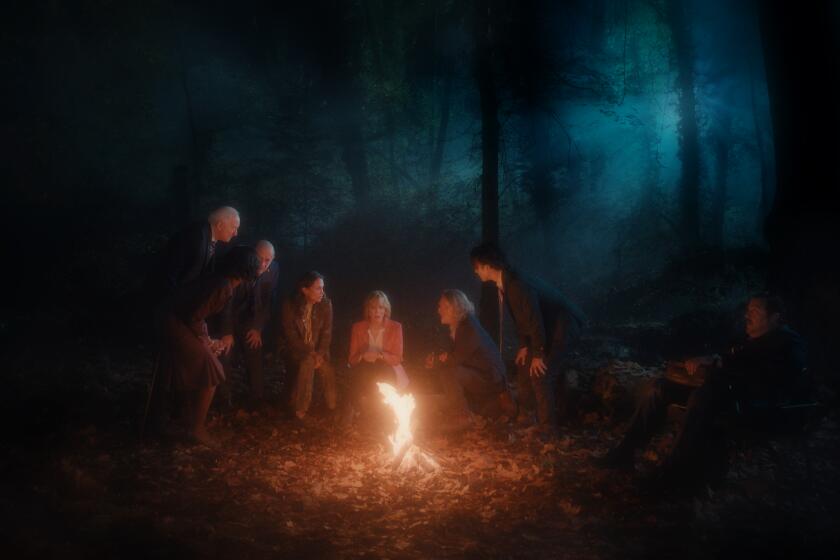Sjoberg Films Wrap Up Swedish Series
The concluding weekend in the UCLA Film Archives’ Swedish series is given over entirely to the work of the late Alf Sjoberg, known in the United States only for launching Ingmar Bergman when he directed Bergman’s script for the somber drama “Torrent” (1944) and for his splendid 1951 version of Strindberg’s “Miss Julie.”
Last week’s showing of “Iris and the Lieutenant” (1946) proved that Sjoberg was capable of bringing realism and social consciousness to the big ‘40s romantic picture. But neither that film nor respectful memories of “Torrent” and “Miss Julie” are preparation for the cumulative impact of the four heretofore unknown Sjobergs on view Saturday and Sunday at UCLA Melnitz. Unquestionably, Sjoberg can be mentioned in the same breath with Bergman, who eclipsed him by the mid-’50s.
In general, Sjoberg, who died in 1980, was as bold, passionate and extroverted as Bergman was cerebral and austere. “The Road to Heaven” (1942), which screens Saturday at 7:30 p.m., is, for example, a stupendous, confounding experience. Rune Lindstrom stars in this dazzling adaptation of his own play, which in effect begins where Dreyer’s monumental “Day of Wrath” (1943) ends. When a pretty young peasant is burned at the stake as a witch, serving as a scapegoat for an outbreak of plague, her devastated fiance (Lindstrom) embarks on a Candide-like, epic-scale spiritual odyssey, involving temptation and redemption--and a dauntingly complex structure of dream fantasies and flashbacks. On another level, this strongly folkloric film is a celebration of the enchanting images of 19th-Century Swedish naive painters. “Miss Julie” is the second feature.
“Only a Mother” (1949), which screens Sunday at 5:30 p.m., is the most accessible of the films. Film historian Richard Roud flatly declares that the performance of Anita Bjork in “Miss Julie” and Eva Dahlbeck in this film are two of the greatest performances in the history of the cinema--and it’s easy to agree with him.
Dahlbeck, who in the ‘50s went on to become one of Bergman’s brightest stars, plays a beautiful, headstrong woman, a farm worker in pre-World War I Sweden whose scandalous nude swim irrevocably determines the course of her life. Yet by the time the film is over we realize that her hard, grinding existence of child-bearing and manual labor would have been the same no matter how she behaved--as long as she was trapped in a virtual serf class.
“Only a Mother,” with its radiant Dahlbeck, possesses the richness and scope of a novel in which its heroine’s life serves as a protest of the relentless exploitation of Sweden’s agricultural working class.
Perhaps even more ambitious than “The Road to Heaven” is the astonishing “Karin Mansdotter” (1954), a romantic historical tragedy centering on the teen-age mistress (lush, exquisite Ulla Jacobsson) of the flighty 16th-Century King Erik XIV (Jarl Kulle). To tell their story Sjoberg and renowned cinematographer Sven Nykvist experimented in several styles--a color (now faded to sepia, alas) prologue done as a silent melodrama, a straightforward adaptation of Strindberg’s play about the brooding monarch, and finally an eloquent, expansive epilogue in which Sjoberg imagines what happened to Karin after the death of Erik.
Karin and Erik become as touching as Norma Shearer’s Marie Antoinette and Robert Morley’s Louis XVI, but there’s a great deal more social consciousness in “Karin Mansdotter” than in the grandiose Metro star vehicle that was “Marie Antoinette.”
The critical and commercial disaster of “Karin Mansdotter” coincided with the international acclaim accorded Ingmar Bergman’s “Smiles of a Summer Night” (1955), and from then on Bergman became Sweden’s preeminent director. However, Sjoberg did keep on working, although less frequently, and capped his career in 1969 with a dynamic, compelling film of his Royal Dramatic Theater production of Strindberg’s “The Father,” starring Gunnel Lindblom as one of the dramatist’s horrendous devouring women and Georg Rydeberg as her victim-husband. Information: (213) 206-8013.
The County Museum of Art will celebrate the 100th birthday of Irving Berlin with a series of movies based on his musicals or incorporating his beloved songs. Kicking off the retrospective in Bing Theater at 1 p.m. today (and again at 8) will be “Top Hat” (1935) and “The Cocoanuts” (1929). Information: (213) 857-6201 or 857-6202.
More to Read
Only good movies
Get the Indie Focus newsletter, Mark Olsen's weekly guide to the world of cinema.
You may occasionally receive promotional content from the Los Angeles Times.







